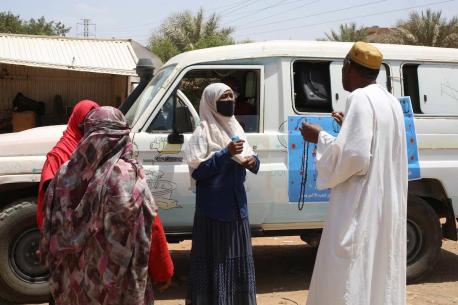
Overcoming Local Resistance to Sudan's COVID-19 Vaccine Rollout
In Sudan, residents who have promoted past immunization campaigns use their know-how and networks to overcome the hesitancy of those at risk.
On March 3, 2021, when over 800,000 doses of the AstraZeneca vaccine arrived at Khartoum International Airport, Sudan became the first country in the Middle East and North Africa (MENA) region to receive COVID-19 vaccines through the COVAX Facility. But as UNICEF knows, vaccines can't work unless the public accepts them.
To bring people around in the Khartoum localities of Ombada, Sharg-e-nile and Jabal Aulia where residents were resistant, UNICEF has reactivated local committees that have promoted past immunization campaigns.

Members of local committees are fanning out in Khartoum state’s Ombada, Sharg-e-nile and Jabal Aulia localities to convince the public that COVID-19 vaccines are safe, effective and free. © UNICEF Sudan/2021
Attendees at one of the first committee meetings in Sharg-e-nile included religious leaders, area residents and a local youth club leader who pledged to mobilize his 50 members to convince their older relatives to get vaccinated. Sudan Ministry of Health and UNICEF experts were also on hand to provide the detailed information needed to address public misconceptions about COVID-19 vaccines.
Armed with all they need to make the case, local immunization boosters have since fanned out, beginning by convincing their families to get vaccinated and using their own social media accounts to educate the people in their networks. Then widening the circle, they have been traveling in vans and on foot — using megaphones and knocking on doors — to get the word out that COVID-19 vaccines are safe, effective and free. Sudan's COVID-19 ambassadors are also staying in close touch with one another, using WhatsApp groups to share successful tactics, community feedback and updates on pockets of resistance.
Sudan's vaccine trust builders have the know-how and tactical skills to win over the elderly and people with preexisting conditions who are most threatened by COVID-19. As UNICEF Communication for Development Specialist Sehrish Ali cheered on those who gathered at the Sharg-e-nile meeting, she expressed the most compelling argument of all: “The vaccine is our only hope!”
You can help UNICEF rush vaccines and critical lifesaving supplies to protect health workers, families and communities in Sudan and around the world. Please donate today.
Top photo: In Sudan, UNICEF-trained health promoters travel by van to reach people in busy public places with messages about COVID-19 vaccines — their availability, safety and effectiveness, along with who is eligible for vaccination and where vaccine doses are available. © UNICEF/UN0458311/Sabir
HOW TO HELP
There are many ways to make a difference
War, famine, poverty, natural disasters — threats to the world's children keep coming. But UNICEF won't stop working to keep children healthy and safe.
UNICEF works in over 190 countries and territories — more places than any other children's organization. UNICEF has the world's largest humanitarian warehouse and, when disaster strikes, can get supplies almost anywhere within 72 hours. Constantly innovating, always advocating for a better world for children, UNICEF works to ensure that every child can grow up healthy, educated, protected and respected.
Would you like to help give all children the opportunity to reach their full potential? There are many ways to get involved.





